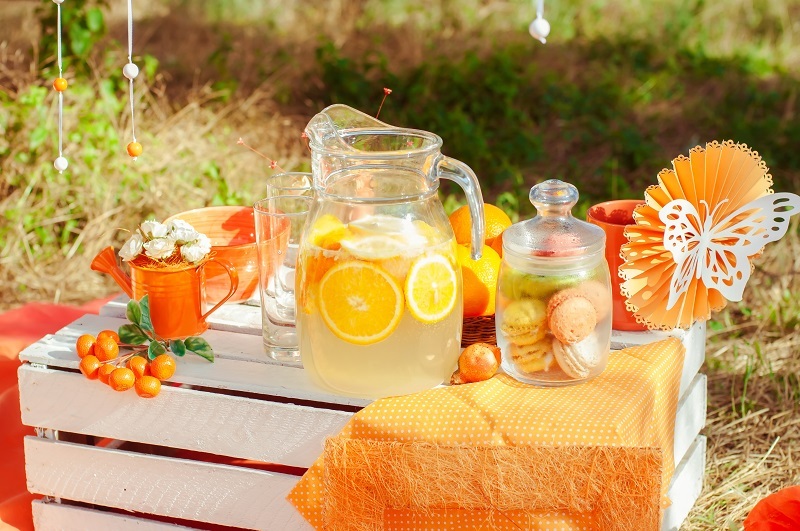Maximizing the Longevity of Your Cut Flowers: A Guide
Posted on 14/08/2025
Maximizing the Longevity of Your Cut Flowers: A Comprehensive Guide
Having fresh cut flowers can instantly elevate any living or work space, imbuing it with natural beauty, color, and a subtle fragrance. But as delightful as a new bouquet is, it can be disappointing to watch those blooms fade and droop in just a few days. If you've ever wondered how to extend the lifespan of your cut flowers, you're not alone. This comprehensive guide explores practical and science-backed ways to maximize the longevity of your floral arrangements and enjoy their freshness for as long as possible.

Understanding Cut Flower Longevity
Before diving into expert tips and tricks, it's helpful to understand exactly what impacts the lifespan of cut flowers. Once flowers are cut, they're separated from their roots and thus lose their natural water and nutrient supply. Several factors come into play that influence how quickly they wilt, including:
- Type of flower: Some species are genetically predisposed to last longer than others.
- Environmental conditions: Light, humidity, and temperature affect wilting.
- Care and handling: Proper conditioning, water quality, and trimming can all help prolong freshness.
By understanding these elements, you can make informed choices to keep your bouquet looking lively and vibrant for as long as possible.
Best Practices for Extending the Life of Fresh Cut Flowers
1. Choose Your Flowers Wisely
Your journey to maximizing the longevity of your cut flowers begins at the point of purchase or harvest. Select blooms that are:
- Not fully open yet: Buds will last longer than fully opened flowers.
- Firm and upright, with unblemished petals and leaves.
- Free from yellowing or damaged foliage.
- Stem ends are moist, not dry or split.
Tip: Some long-lasting flowers include chrysanthemums, alstroemeria, carnations, lilies, and orchids.
2. Immediate Conditioning Upon Arrival
Once you bring your flowers home or receive a bouquet, immediate care is critical. Conditioning your cut flowers correctly sets the stage for longer-lasting arrangements.
- Unpack flowers immediately.
- Remove any plastic or cellophane wrapping.
- Re-cut stems: Use a sharp, clean knife or scissors to trim 1-2 inches off the bottom at a 45-degree angle. This maximizes surface area for water uptake.
- Strip leaves: Remove leaves that will rest below the water line, as submerged foliage can rot and breed bacteria.
- Place flowers in water right away after trimming to prevent air from entering the stems ('embolism'), which impedes hydration.
3. Use Clean Vases and Fresh Water
If you want to make cut flowers last longer, cleanliness cannot be overstated. Dirty containers can promote bacterial growth, which quickly shortens the lifespan of your flowers.
- Wash vases thoroughly with warm, soapy water before use.
- Fill with lukewarm water (unless you're arranging bulb flowers like tulips or daffodils; use cold water for these).
- Change the water daily or every other day to reduce bacteria.
4. Feed Your Flowers: The Right Flower Food
Commercial flower food packets contain the ideal mix of nutrients, biocides, and acidifiers designed to prolong the life of your vase flowers. Whenever possible:
- Use the packet provided by your florist, following the instructions on dilution.
- If you're out of flower food, make homemade alternatives: mix 1 teaspoon sugar, 2 teaspoons lemon juice, and a few drops of bleach into a quart of water.
Note: Dosing matters--too much sugar can accelerate wilting, and too much bleach can damage delicate petals.
5. Trim Stems Regularly
Every 2-3 days, re-cut stems to ensure they continue to absorb water efficiently. Always make your cuts at an angle and under running water or submerged to prevent air from entering the stems.
6. Optimal Placement: Location, Location, Location
Where you position your bouquet significantly impacts its durability. To get your cut flowers to last longer:
- Keep arrangements away from direct sunlight and heat sources, which speed up wilting.
- Maintain a consistently cool room temperature.
- Avoid placing flowers near ripening fruit, as fruit emits ethylene gas that hastens aging in flowers.
- Keep away from drafts or air vents--rapid air movement dehydrates petals.
7. Remove Wilting Blooms Promptly
Check your bouquet daily and remove any dead or wilting flowers. Dying flowers release ethylene gas, which can significantly decrease the lifespan of remaining blooms.
Advanced Techniques to Enhance Vase Life
Using Preservatives and Anti-Bacterial Agents
Aside from sugar and lemon juice, there are additional household substances that can function as flower preservatives:
- Aspirin: Crush an uncoated tablet and add to vase water; it lowers pH and inhibits bacteria.
- Vodka: A few drops can slow down ethylene production and help keep water fresher.
- Apple cider vinegar: Mix 2 tablespoons vinegar with water to serve as both nutrient and antibacterial agent.
Special Tips for Different Flower Types
- Roses: Remove thorns and cut at an angle; if heads droop, submerge the entire stem and bloom in cool water for 30 minutes.
- Tulips: Keep stems straight in a tall vase; refresh with cold water as tulips continue to grow after cutting.
- Hydrangeas: Dip stems in boiling water for 30 seconds or dip in alum powder to unclog pores.
Avoiding Common Mistakes That Shorten Vase Life
- Never use rusty or dirty tools--they introduce bacteria immediately.
- Don't overcrowd your vase; blooms need space for air circulation and water).
- Refrain from exposing flowers to cigarette smoke or fumes, which accelerates decay.
- Don't let leaves sit below the waterline, as they rot and create breeding grounds for bacteria.
Common Myths About Keeping Cut Flowers Fresh
- Myth 1: Pennies keep flowers fresh. While copper is an anti-fungal agent, modern pennies lack sufficient copper content to be effective.
- Myth 2: Bleach will preserve flowers forever. While a tiny bit helps, too much damages delicate petals.
- Myth 3: Only cold water works. Lukewarm is best for most flowers, though some spring bulbs prefer cold.
Eco-Friendly Tips for Enjoying Cut Flowers Longer
Looking to enhance the vase life of your cut flowers in a sustainable way? Consider these green strategies:
- Reuse your flower food packets by diluting them slightly for subsequent bouquets.
- Compost spent blooms and foliage to turn waste into nutrient-rich soil amendments.
- Grow your own seasonal flowers: Freshly cut from your garden, they haven't endured transportation stress and generally last longer.
Frequently Asked Questions About Cut Flower Longevity
How long do cut flowers normally last?
Most cut flowers last between five to 14 days, depending on the flower type, care routine, and environment.
What are the best flowers for long-lasting arrangements?
Carnations, alstroemeria, orchids, lilies, chrysanthemums, and gladiolus are renowned for extended vase life.
Should I chill my flowers overnight?
Some florists recommend refrigerating bouquets overnight to extend freshness, but avoid temperatures near freezing; 4-7?C (39-44?F) is ideal.

Summary: Maintaining Flower Freshness--Key Takeaways
- Buy or cut the freshest blooms available.
- Condition flowers properly, re-cutting stems and removing excess foliage.
- Keep water and vase impeccably clean, changing water daily.
- Use high-quality commercial or homemade flower food.
- Position your arrangement in a cool, shaded place away from direct sunlight, fruit, and drafts.
- Remove spent blooms and leaves regularly to prevent ethylene buildup.
Conclusion: Unlocking the Secrets to Long-Lasting Bouquets
With the right knowledge and care techniques, you can dramatically maximize the longevity of your cut flowers and enjoy their vibrant presence for over a week, often much longer. Consistent, proactive care--starting from the moment you bring your blooms home--makes all the difference in the world. By applying these tips and techniques, not only will your floral arrangements last longer, but you'll also get the most value and joy out of each beautiful stem.
Remember, every flower tells a story, and with a little extra care, you can savor that story for days on end. Happy arranging!
Latest Posts
Essential Hydrangea Care for Lush Growth
Transform Your Poinsettias into Long-Lasting Beauties
The Fascinating Insights Your Birth Flower Offers







